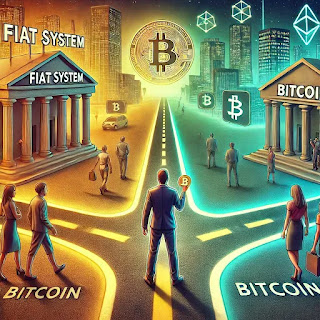Bitcoin and the Death of Permission
Picture this: a farmer in Kenya sells his surplus harvest to a buyer in Japan, payment sent instantly. A coder in Argentina gets paid by a client in Canada without a bank ever touching the transaction. A teenager in the U.S. tips an artist in Nigeria in seconds. No forms. No approvals. No one to say “no.” This is Bitcoin’s silent revolution, a borderless, permissionless transfer of value that no central power can stop.
For centuries, money has been chained to permission. From kings who demanded tribute before allowing trade, to banks controlling who gets an account, to governments deciding which transactions are legal, access to economic participation has been gatekept. The medieval merchant had to go through royal tax collectors. In the 20th century, the bank teller or the SWIFT network was the gate. Even in our digital age, moving money is rarely just between you and the recipient, it is between you, the bank, the processor, the regulator, and their rules.
Gatekeepers have used this control to shape economies, enforce policy, and let’s be honest, protect their own power. Banks can freeze your account without warning. Governments impose capital controls that lock your wealth inside borders. Payment processors deny service based on politics or morality. Every one of these chokepoints operates on the same principle: you must ask first.
Bitcoin flips that. By design, it removes the ability for anyone to say “no.” It is peer-to-peer, which means there’s no intermediary to stop a transaction. Its network is open, anyone with internet access can use it. It is built to resist censorship and confiscation. You don’t apply for permission to join Bitcoin; you simply use it.
This permissionless nature comes from decentralization. Bitcoin is validated by thousands of nodes worldwide, each enforcing the same transparent rules. Miners don’t choose who can transact; they simply confirm valid transactions, no matter who sends them. There’s no application form, no credit score, no government ID check. It’s the same rules for a billionaire in New York and a villager in rural India.
And in that equality lies the inversion of centuries of economic hierarchy. Suddenly, individuals hold sovereignty over their wealth. Political dissidents can receive donations from supporters across the globe. Refugees can carry their life savings across borders in a 12-word seed phrase. Entrepreneurs can launch businesses without asking a bank to bless them with an account. The balance of power shifts from institutions to individuals, and the institutions know it.
The last time humanity saw a shift like this was the printing press. Once people could print and distribute ideas without church or crown permission, information monopolies collapsed. Bitcoin is the printing press for money. Once you experience the freedom of permissionless value transfer, there’s no going back.
Naturally, the old guard will fight back. We’ll see governments warn about “untraceable criminal money” and “risks to the financial system.” We’ll see banks refuse to serve Bitcoin businesses. We’ll see media spin fear around its volatility and energy use. But each attack is proof of what’s at stake: the gatekeepers’ monopoly on permission.
Imagine the alternative future, a world where starting a business, funding a cause, or sending help to family abroad is as simple as sending an email. Innovation moves at the speed of human imagination because bureaucracy can’t keep up. Collaboration between people across borders becomes effortless. The friction of permission disappears, and with it, centuries of economic stagnation caused by control.
Bitcoin doesn’t ask. It doesn’t wait. It doesn’t require you to prove you’re worthy of using it. In this new era, the old gatekeepers become irrelevant relics, clinging to their keys while the rest of the world walks through open doors. The death of permission isn’t coming, it’s already here. And Bitcoin is leading the funeral procession.
Tick tock, next block.




Comments
Post a Comment